Samsung Galaxy Nexus & Ice Cream Sandwich Review
by Brian Klug & Anand Lal Shimpi on January 18, 2012 1:34 PM ESTBattery life remains the other big axis on which smartphones are judged, and here we've turned to our regular 2011 suite of battery life tests to see how the Galaxy Nexus shakes out. Our battery life testing consists of a page loading suite which loads through a few dozen pages endlessly on both WiFi and cellular data until the phone dies, with the display set at 200 nits. For the cellular tests, we're always careful to test in cellular environments with decent signal (at least -75 dBm or higher) as well, since that's a factor. Next is a simple call test where we play music at both ends of a call until the device under test dies, and our final test is a WiFi hotspot workload which consists of four page loading tabs and a 128 kbps streaming MP3 station that runs until the phone dies.
First up are the web browsing tests over cellular 3G; this means EVDO Rev.A for the CDMA/LTE version, and WCDMA T-Mobile for the GSM/UMTS device.
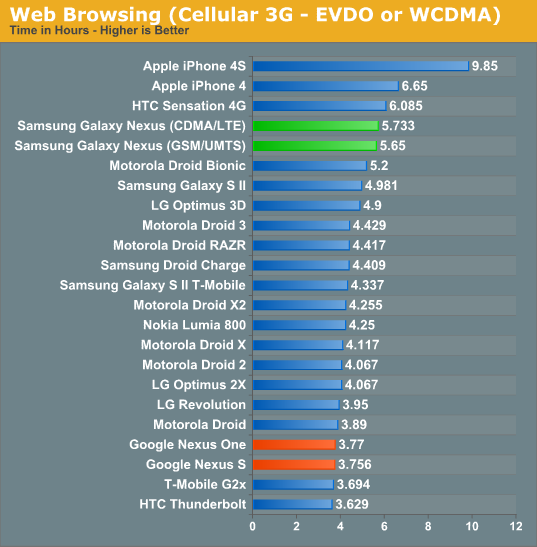
The Galaxy Nexii both do surprisingly well. I'm actually very impressed with how long the devices lasted subjectively on 3G and this definitely backs that up. Of course, both devices include beefy batteries, but Samsung has done a nice job thus far including big batteries without making devices bulky or heavy.
Next up is the same test, but on 4G LTE for the CDMA/LTE variant.
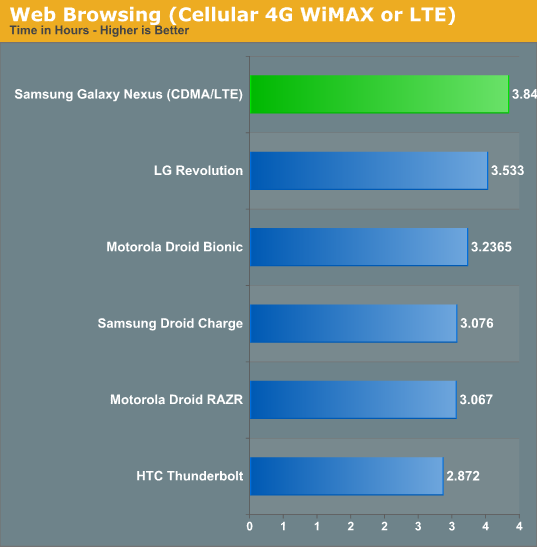
The Galaxy Nexus doesn't post numbers very far in front, but manages to come in the top of the pack on 4G LTE at just under 4 hours. This is a pretty impressive result, honestly, considering that CMC221 is likely made on the same 45nm manufacturing process as CMC220. Again, I'm impressed with the Galaxy Nexus' longevity even on 4G LTE.
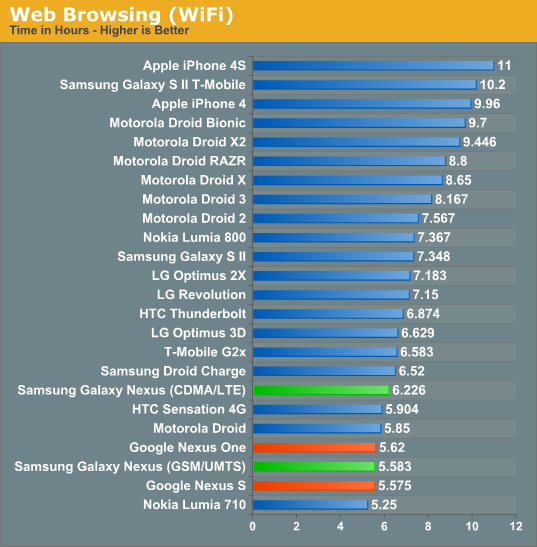
Surprisingly, the Galaxy Nexus can't break past that 6 hour mark even on WiFi, however, which does lead me to think we might be constrained by driving that display.
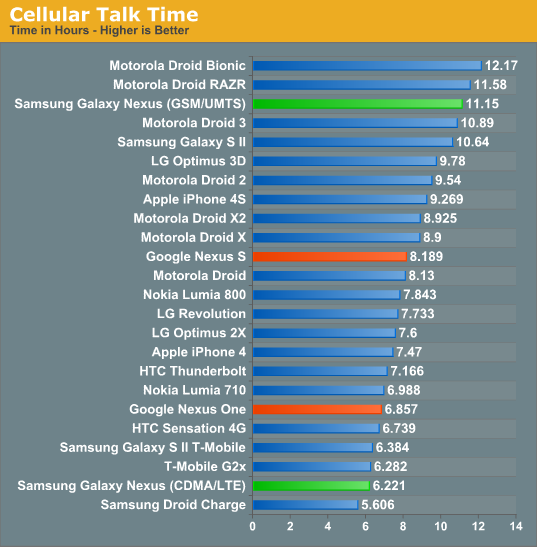
If you ever wanted to see how much difference having a different cellular architecture makes, see above. The GSM/UMTS Galaxy Nexus lasts impressively long on a voice call, at over 11 hours, yet its CDMA/LTE brother lasts just over half that.
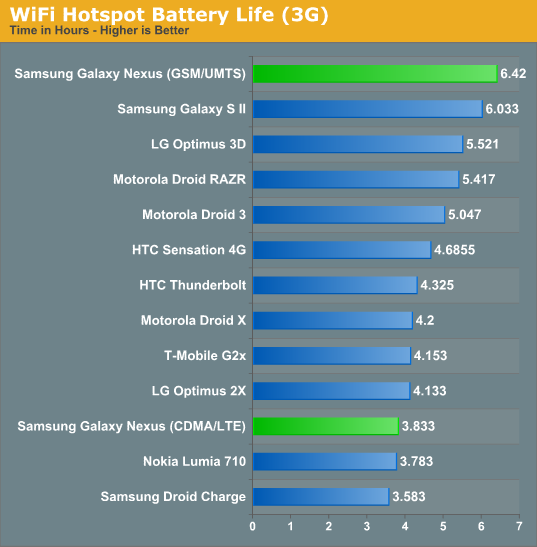
WiFi hotspot on 3G tells the same story - I'm not sure what Via Telecom's CBP7.1 draws in its active state for EVDO or 1x voice, but it seems to eat up more power than the XMM 6260 (X-Gold 626) in the GSM/UMTS Galaxy Nexus.
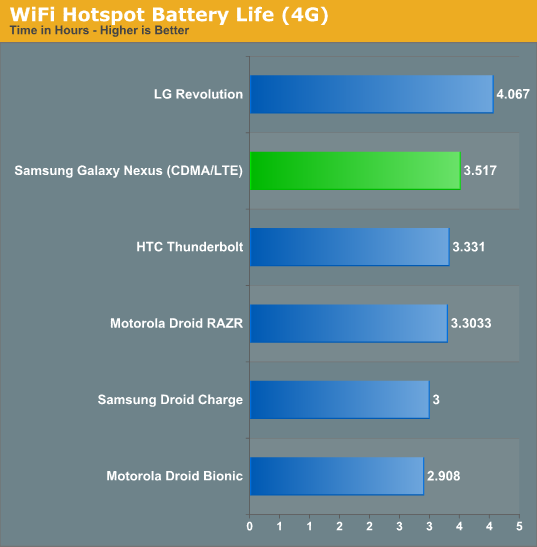
As a 4G LTE WiFi hotspot, the Galaxy Nexus loses its edge over the Revolution, but does come in just ahead of the rest of the 4G LTE herd.
The story of battery life on the Galaxy Nexus unsurprisingly depends on which variant you're talking about. For a phone with a 4.65" display, I'd say I'm impressed with the battery life on both devices - remember that the area that needs to get lit up goes as r^2 - increasing that and not killing the battery is a big feat. In addition, I'd wager that using the OpenGL ES renderpath (and accelerated browser in 4.0) definitely helped both Galaxy Nexus devices post impressive scores. As for the two variants, the GSM/UMTS device has impressively long battery life pretty much across the board. Playing with that phone, I was rarely wanting for more on my regular use schedule (I charge at night on my nightstand). We've seen XMM6260 before in numerous devices where it seems to be a pretty good citizen.
The CDMA/LTE variant, on the other hand, depends strongly on what air interface you end up using most - on 4G LTE the device comes in at the front of the pack usually, and its 3G web browsing test is above average. However, if you make a lot of voice calls, the phone might not cut it. Unsurprisingly the CDMA/LTE Galaxy Nexus does nothing to dramatically change 4G LTE battery life - for that we're still waiting for upcoming 28nm LTE basebands.










185 Comments
View All Comments
jamyryals - Thursday, January 19, 2012 - link
I liked this review very much. Do a video wrap up of the CES experience!HangFire - Thursday, January 19, 2012 - link
Anand,Are you using 2.2 era data for Thunderbolt battery life in the graph, or are you using modern Gingerbread data? The Thunderbolt has come a long way in managing battery life since introduction.
HF
Brian Klug - Thursday, January 19, 2012 - link
HF,Yeah, we're using the initial launch performance of the HTC Thunderbolt here. Unfortunately HTC wanted that phone back, so we can't test with the newer updates. This is one thing we're working on changing this year.
-Brian
lewchenko74 - Thursday, January 19, 2012 - link
I moved from an iphone 4 to the Galaxy Nexus... and there are issues that are not listed in this review.My only previous Android phone was a HTC Hero, which I rooted to 2.1 after no carrier support (Orange in the UK suck). Im happy with ICS in general.. but the phone itself has 2 really annoying major flaws which have happened to me on many occasion ...
1. The random turn off problem.
2. The random mic turning off mid call problem.
Both are discussed quite a bit on sites like androidcentral.com and xda-developers.com forums, and seem to be happening to MANY (see the forum pages yourself) people, whether you have a GSM version, US phone on all versions of ICS. Swapping out hardware for a different phone is not solving the problems, and whilst infrequent for me , they happen to other people far more. (and not at all to some people..)
In other words... Either ICS has a couple of critical bugs, or the hardware is at fault (or the firmware)..
Both issues are apparently acknowledged by google as well.... yet seem to be getting little to no publicity. BGR.com recently reported the random turn off problem with the Nexus.
So well done on the thorough review, but I wish somebody had warned me about these issues.
I dont regret switching from the iphone 4 (screen was too small, and the lack of customisation was frustrating.. and the 4s was such a major dissapointment)... the Galaxy Nexus is a phone with serious problems (hopefuly ones that can be resolved with updates).
Links to the forum pages of the issues :
http://code.google.com/p/android/issues/detail?id=...
http://forum.xda-developers.com/showthread.php?t=1...
http://forum.xda-developers.com/showthread.php?t=1...
http://forums.androidcentral.com/samsung-galaxy-ne...
B3an - Thursday, January 19, 2012 - link
These both seem like a very common issue. Pretty serious problems too, not exactly something small. Disappointing to see no mention of this in the article.anandtech pirate - Thursday, January 19, 2012 - link
really? you guys, a tech site, uploaded a 480p quality video in 2012? sigh....tipoo - Friday, January 20, 2012 - link
Ah yes, if I can't see every follicle in his beard the review loses all its informativeness! lolNevod - Friday, January 20, 2012 - link
Very weird battery life measurements.Judging by Wi-Fi hotspot and Talk time, Wi-Fi and cellular basebands are comparable in efficiency to other modern devices. Advantage over SGSII seems to be proportional to battery.
Cellular web browsing time is quite good. Yet so low Wi-Fi browsing time - looks like it goes into some "hunger mode", like not caching anything when on Wi-Fi.
Also, there is an option in ICS browser to invert colors, switches black and white , probably to extend battery life on OLED screens, as, well, sites usually have white backgrounds and that's not very nice to battery. Would be interesting to see tests of battery performance on inverted colors.
Bytales - Friday, January 20, 2012 - link
Please Anandtech, if you have the posibillity, make a review of Galaxy NoteArtifex28 - Friday, January 20, 2012 - link
You should use some curtains to kill the early reflections from concrete walls. :)